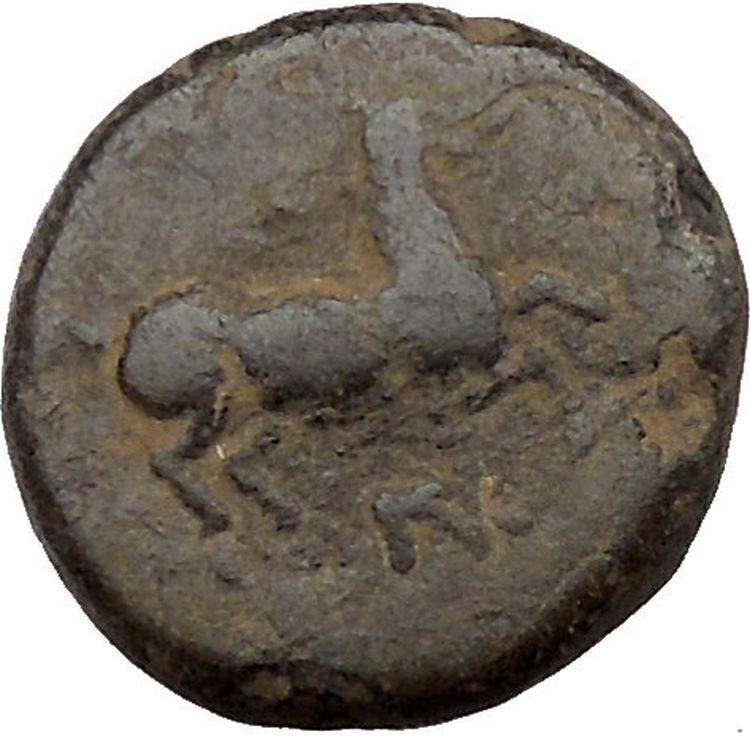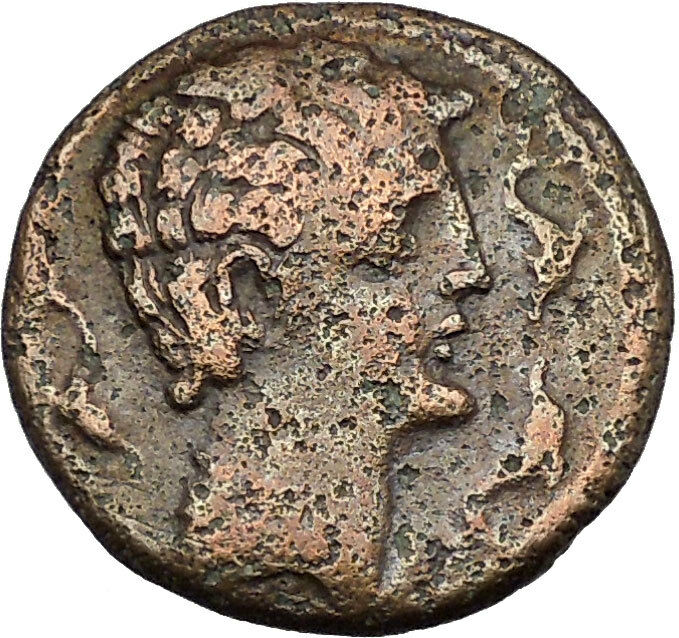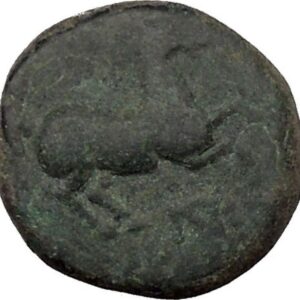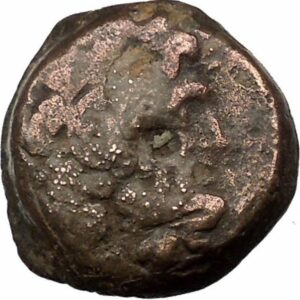|
Seleukid Kindom
Antiochos I, Soter – King:
281-261 B.C.
Silver Tetradrachm 27mm (15.89 grams) Seleukeia on the Tigris mint, 220 B.C.
Reference: HGC 9, 236g; SC 587.4b
Diademed head of Antiochos I right.
ΒΑΣΙΛΕΩΣ ANTIOXOY, Apollo seated
left on omphalos, holding arrow and grounded bow; monogram in field to left and
right.
You are bidding on the exact item pictured,
provided with a Certificate of Authenticity and Lifetime Guarantee of
Authenticity.

In
Greek
and
Roman mythology
,
Apollo, is one of the most
important and diverse of the
Olympian deities
. The ideal of the
kouros
(a beardless youth), Apollo has been
variously recognized as a god of light and the sun; truth and prophecy;
archery
; medicine and healing; music, poetry,
and the arts; and more. Apollo is the son of
Zeus and Leto
, and has a
twin
sister, the chaste huntress
Artemis
. Apollo is known in Greek-influenced
Etruscan mythology
as Apulu. Apollo was
worshiped in both
ancient Greek
and
Roman religion
, as well as in the modern
Greco
–Roman
Neopaganism
.
As the patron of Delphi
(Pythian Apollo), Apollo was an
oracular
god — the prophetic deity of the
Delphic Oracle
. Medicine and healing were
associated with Apollo, whether through the god himself or mediated through his
son Asclepius
, yet Apollo was also seen as a god
who could bring ill-health and deadly
plague
as well as one who had the ability to
cure. Amongst the god’s custodial charges, Apollo became associated with
dominion over
colonists
, and as the patron defender of herds
and flocks. As the leader of the
Muses (Apollon Musagetes) and director of their choir, Apollo
functioned as the patron god of music and
poetry
.
Hermes
created the
lyre for him, and the instrument became a common
attribute
of Apollo. Hymns sung to Apollo were
called paeans
.
In Hellenistic times, especially during the third century BCE, as Apollo
Helios he became identified among Greeks with
Helios
,
god of the sun
, and his sister Artemis
similarly equated with
Selene
,
goddess of the moon
. In Latin texts, on the
other hand, Joseph Fontenrose declared himself unable to find any conflation of
Apollo with
Sol
among the
Augustan poets
of the first century, not even
in the conjurations of
Aeneas
and
Latinus
in
Aeneid
XII (161–215). Apollo and Helios/Sol
remained separate beings in literary and mythological texts until the third
century CE.
Antiochus I Soter (Greek:
Ἀντίοχος Α΄ ὁ Σωτήρ;
epithet
means “the Saviour”; c. 324/3 – 261
BC), was a king of the
Hellenistic
Seleucid Empire
. He reigned in 281–261 BC.
Antiochus I was half
Persian
, his mother
Apama
being one of the eastern princesses whom
Alexander the Great
had given as wives to his
generals in 324 BC. In 294 BC, prior to the death of his father
Seleucus I
, Antiochus married his stepmother,
Stratonice
, daughter of
Demetrius Poliorcetes
. His elderly father
reportedly instigated the marriage after discovering that his son was in danger
of dying of lovesickness. Stratonice bore five children to Antiochus: Seleucus
(he was executed for rebellion), Laodice,
Apama II
,
Stratonice of Macedon
and
Antiochus II Theos
, who succeeded his father as
king.
On the assassination of his father in 281 BC, the task of holding together
the empire was a formidable one. A revolt in
Syria
broke out almost immediately. Antiochus
was soon compelled to make peace with his father’s murderer,
Ptolemy Keraunos
, apparently abandoning
Macedonia
and
Thrace
. In
Anatolia
he was unable to reduce
Bithynia
or the Persian dynasties that ruled in
Cappadocia
.
In 278 BC the Gauls
broke into Anatolia, and a victory that
Antiochus won over these Gauls by using Indian
war elephants
(275 BC) is said to have been the
origin of his title of Soter (Gr.
for “saviour”).
At the end of 275 BC the question of
Coele-Syria
, which had been open between the
houses of Seleucus and
Ptolemy
since the partition of 301 BC, led to
hostilities (the
First Syrian War
). It had been continuously in
Ptolemaic
occupation, but the
house of Seleucus
maintained its claim. War did
not materially change the outlines of the two kingdoms, though frontier cities
like Damascus
and the coast districts of Asia Minor
might change hands.
On March 27 268 BC Antiochus I laid the foundation for the Ezida Temple in
Borsippa
.
His eldest son Seleucus had ruled in the east as viceroy from 275 BC(?) till
268/267 BC; Antiochus put his son to death in the latter year on the charge of
rebellion. Circa 262 BC Antiochus tried to break the growing power of
Pergamum
by force of arms, but suffered defeat
near Sardis
and died soon afterwards. He was
succeeded in 261 BC by his second son
Antiochus II Theos
.
Seleucid
Empire
Σελεύκεια
Seleúkeia |

|
312 BC–63 BC |
↓
|
|
|
The Seleucid Empire in 301 BC.
|
The Seleucid Empire
was a
Hellenistic
state ruled by the Seleucid dynasty
founded by
Seleucus I Nicator
following the division of
the empire created by
Alexander the Great
. Seleucus received
Babylonia
and, from there, expanded his
dominions to include much of Alexander’s
near eastern
territories. At the height of its
power, it included central
Anatolia
, the
Levant
,
Mesopotamia
,
Kuwait
,
Persia
,
Afghanistan
,
Turkmenistan
, and northwest parts of
India
.
The Seleucid Empire was a major center of
Hellenistic
culture that maintained the
preeminence of
Greek
customs where a Greek-Macedonian
political elite dominated, mostly in the urban areas. The Greek population of
the cities who formed the dominant elite were reinforced by emigration from
Greece
. Seleucid expansion into
Anatolia
and Greece was abruptly halted after
decisive defeats
at the hands of the
Roman army
. Their attempts to defeat their old
enemy
Ptolemaic Egypt
were frustrated by Roman
demands. Much of the eastern part of the empire was conquered by the
Parthians
under
Mithridates I of Parthia
in the mid-2nd century
BC, yet the Seleucid kings continued to rule a
rump state
from
the Seleukid Kingdom
until the invasion by
Armenian
king
Tigranes the Great
and their ultimate overthrow
by the Roman
general
Pompey
.
|









